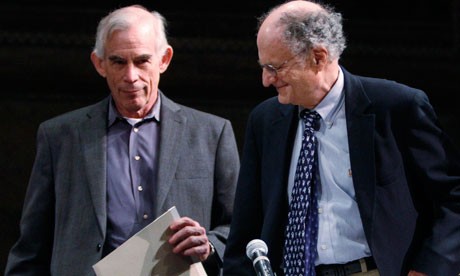Economics Nobel Prize Winners
Post on: 6 Июль, 2015 No Comment

google+
In 1968 Sveriges Riksbank the Sweden’s central bank introduced Nobel Prize in Economics Science in memory of Alfred Nobel. The first prize in econimics science was awarded to Ragnar Frisch and Jan Tinbergen in the year 1969.
Nobel Prize Winners (Laureates) in Economics
Here is a list of the winners of the Nobel Prize in Economic Sciences since 1970:
1970 Paul, A, Samuelson (U.S.), for efforts to raise the level of scientific analysis in economic theory.
1973 Wassily Leontief (U.S.), for devising the input-output technique to determine how different sectors of an economic, social and institutional phenomena.
1974 Gunnar Myrdal (Sweden) and Friedrich A. von Hayek (UK), for pioneering analysis of the interdependence of economic, social and institutional phenomena.
1975 Leonid V. Kantorovich (USSR) and Tjalling C. Koopmans (U.S.), for work on the theory of optimum allocation of resources.
1976 Milton Friedman (U.S.), for work in consumption analysis and monetary history and theory, and for demonstration of complexity of stabilization policy
1977 Bertil Ohlin (Sweden) and James E. Meade (UK), for contributions to theory of international trade and international capital movements.
1978 Herbert A. Simon (U.S.), for research into the decision-making process within economic organizations.
1979 Sir Arthur Lewis (UK) and Theodore Schultz (U.S.), for work on economic problems of developing nations.
1980 Lawrence R. Klein (U.S.), for developing models for forecasting economic trends and shaping policies to deal with them.
1981 James Tobin (U.S.), for analyses of financial markets and their influence on spending and saving by families and businesses
1982 George J. Stigler (U.S.), for work on government regulation in the economy and the functioning of industry
1983 Gerard Debreu (U.S.), in recognition of his work on the basic economic problem of how prices operate to balance what producers supply with what buyers want
1984 Sir Richard Stone (UK), for his work to develop the systems widely used to measure the performance of national economics
1985 Franco Modigliani (U.S.), for his pioneering work in analyzing the behavior of household savers and the functioning of financial markets
1986 James M. Buchanan (U.S.), for his development of new methods for analyzing economic and political decision-making.
1987 Robert M. Solo (U.S.), for seminal contributions to the theory of economic growth.
1988 Maurice Allais (France), for his pioneering development of theories to better understand market behavior and the efficient use of resources
1989 Trygve Haavelmo (Norway), for his pioneering work in methods for testing economic theories.
1990 Harry M. Markowitz, William F. Sharpe, and Merton H. Miller (all U.S.), whose work provided new tools for weighing the risks and rewards of different investments and for valuing corporate stocks and bonds
1991 Ronald Coase (U.S.), for his pioneering work in how property rights and the cost of doing business affect the economy.
1992 Gary S. Becker (U.S.), for having extended the domain of economic theory to aspects of human behavior which had previously been dealt with-if at all-by other social science disciplines
1993 Robert W. Fogel and Douglass C. North (both U.S.), for their work in economic history
1994 John F. Nash, John C. Harsanyi (both U.S.), and Reinhard Selten (Germany), for their pioneering work in game theory
1995 Robert E. Lucas, Jr. (U.S.), for having and the greatest influence on macroeconomic research since 1970
1996 James A. Mirrlees (UK) and William Vickrey (U.S.), for their fundamental contributions to the economic theory of incentives
1997 Robert C. Merton and Myron S. Scholes (both U.S.), for developing a formula that determines the value to stock options and other derivatives.
1998 Amarty Sen (India), for his contributions to welfare economics
1999 Robert A, Mundel (Canada), for his work on monetary dynamics and optimum currency areas
2000 James J. Heckman and Daniel L. McFadden (both U.S.), for developing methods used in statistical analysis of individual and household behavior
2001 George A. Akerlof, A. Michael Spence, and Joseph E. Stiglitz (all U.S.), for market analyses with asymmetric information
2002 Daniel Kahneman (U.S.), for having integrated insights from psychological research into economic science; Vernon L. Smith (U.S.), for having established laboratory experiments as a toolin empirical economic analysis.
2003 Robert.F.Engle (US) and Clive W.J.Granger (UK) for developing the statistical tools for stock prices.
2004 Finn. E. Kydland (Norway) and Edward C. Prescott (US) for their contribution in macro economics.
2005 Robert Auman and Thomas Schillong for their contribution to Game Theory.
2006 Edmund S. Phelps (USA), for his analysis of intertemporal tradeoffs in macroeconomic policy.
2007 Leonid Hurwicz. Eric S Maskin. and Roger B. Myerson for having laid the foundations of mechanism design theory.














